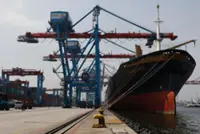Foreign Minister Retno LP Marsudi speaking during the two-day Summit of the Future at the UN headquarters in New York recently. —Reuters
“EIGHTY per cent of success is showing up” – a saying often wrongly attributed to American filmmaker Woody Allen – perfectly captures the paradox of the recent rise of Indonesia’s diplomatic influence.
According to the 2024 Lowy Institute Asia Power Index, Indonesia’s power has grown more than any other country in the region since 2018, jumping 2.9 points in 2024 alone.
This begs the question: How much further could Indonesia’s influence have risen if President Joko “Jokowi” Widodo had shown up at more international forums?
The Jokowi presidency has been generally marked by a pragmatic approach to global engagement, focusing on domestic priorities while delegating others to attend international events in his stead. In the past decade, Jokowi has skipped every in-person United Nations General Assembly (UNGA) general debate, though he was arguably present via prerecorded video during the pandemic. This year marks the 10th consecutive UNGA he missed, which is an unfortunate, albeit consistent, record.
In the early years of his first term, with a few exceptions, his vice president Jusuf Kalla admirably took on the task, representing Indonesia with charisma and gravitas at the UN.
Foreign Minister Retno Marsudi has carried the diplomatic torch ever since, serving tirelessly as the country’s UN envoy for two terms.
Retno’s efforts, along with those of Indonesia’s robust diplomatic apparatus, have been nothing short of remarkable. In addition, the country successfully held the UN Security Council presidency twice in 2019-2020, the Group of 20 presidency in 2022 and the Asean chairmanship in 2023.
Yet, these achievements seemed to have done on autopilot: Imagine how much farther Indonesia’s global standing could have been elevated upon consistent representation by the head of state.
Jokowi indeed managed quite well in navigating choppy geopolitical waters during Indonesia’s G20 presidency and Asean chairmanship in the face of two different wars. However, we all know that interests were the President’s overarching motivations, rather than a principled stance on global affairs.
The Lowy Institute’s report underscores Indonesia’s enhanced influence despite Jokowi’s limited personal engagement, highlighting its economic diplomacy and growing trade relationships with regional partners. In fact, Indonesia’s score now places it among the nine most influential countries in Asia, according to Lowy’s index.
But what if Jokowi had been a more commanding presence on the world stage, leveraging these occasions to assert Indonesia’s role as a burgeoning middle power en route to becoming one of the largest economies by 2045?
An opportunity for a strategic shift is evident as Prabowo Subianto prepares to take office next month. The retired army general’s international credentials are well acknowledged in his current role as defence minister, and rumours even suggested he was gearing up to attend this year’s UNGA alongside Retno.
Such a move would have signalled Indonesia’s renewed commitment to multilateral diplomacy while providing a seamless global introduction to its next president. It is also an opportunity for Indonesia to step into the global spotlight and lead from the front, rather than from the shadows.
For Prabowo, demonstrating this commitment starts with selecting a highly capable foreign minister who can collaborate closely with him in ensuring that Indonesia continues to be an active player in international affairs.
Retno has done an admirable job, but it’s high time that a president shares the burden of diplomacy. Attendance at a global forum is not just symbolic, it is a statement of intent: a declaration that Indonesia is ready to take its place among the world powers.
By being physically present, Prabowo can build on recent diplomatic wins, ensuring that Indonesia doesn’t simply maintain its upward trajectory, but accelerates it.
If the Jokowi presidency has taught us anything, it’s that success can be achieved in diplomacy even when the captain isn’t steering the ship. But imagine the heights we Indonesians could achieve with a leader who understands that sometimes, showing up is more than half the battle. — The Jakarta Post/ANN






